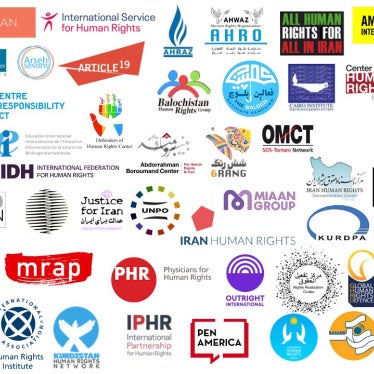(Brussels) – EU High Representative Federica Mogherini should publicly urge Gulf countries to release immediately and unconditionally activists detained for exercising their rights, Human Rights Watch said in a letter to her today. The letter was sent ahead of a Gulf Cooperation Council-EU ministerial meeting in Doha on May 24, 2015.
The GCC countries’ crackdown on freedom of expression and association has resulted in the imprisonment of many activists and dissidents. Member countries are Bahrain, Kuwait, Oman, Qatar, Saudi Arabia, and the United Arab Emirates.
“Despite the EU’s oft-stated commitment to human rights, it hasn’t so much thrown its weight behind advocates of human rights in the Gulf as nervously wagged its finger,” said Lotte Leicht, EU director. “The EU should take inspiration from the courage of detained GCC activists, and call for their immediate release.”
In June 2014, EU foreign ministers pledged to “intensify” the EU’s “political and material support to human rights defenders and step up its efforts against all forms of reprisals.” Human Rights Watch urged the EU to translate this commitment into concrete action and policy demands that go beyond mere expressions of support for those unfairly imprisoned.
Many dissidents, political activists, human rights defenders, journalists, lawyers, and bloggers have been imprisoned across the Gulf region, often for nothing more than exercising their rights to free expression and association. Many were convicted after unfair trials and allegations of torture in pretrial detention. GCC governments have responded to growing citizen use of social media by resorting to repressive laws and in some cases by enacting new, more draconian ones, in the name of national security.
In Bahrain, the rights situation continues to deteriorate. Some EU member states and Members of the European Parliament have called for the immediate and unconditional release of the prominent rights activist Nabeel Rajab. But the EU has yet to make a specific call for his release or that of 13 other high-profile activists – including two EU citizens, Abdulhadi al-Khawaja of Denmark and Shaikh Mohamed Habib Almuqdad of Sweden. All are serving life or other long sentences on charges that relate solely to their peaceful exercise of their rights to freedom of expression and association.
In Saudi Arabia, the human rights activist Waleed Abu al-Khair and the blogger Raif Badawi are among those serving lengthy prison sentences for their peaceful criticism of the authorities.
The Saudi Interior Ministry issued a counterterrorism regulation in 2014 that designates certain groups as terrorist organizations and contains other provisions that proscribe acts such as “calling for atheist thought,” “throw[ing] away loyalty to the country’s rulers,” “contact or correspondence with any groups, currents [of thought], or individuals hostile to the kingdom,” and participating in or calling for protests or demonstrations.
In the United Arab Emirates, which claims to be a world leader in combating extremist ideologies, the human rights lawyers Mohamed al-Roken and Mohamed al-Mansoori and 67 other defendants were convicted in 2013 of attempting to overthrow the state and sentenced to prison in a mass trial. The trial was undermined by due process violations and credible allegations that some defendants were tortured. A 2014 counterterrorism law includes death sentences for offenses used to prosecute peaceful critics of the government and people the authorities consider opposed to Islamic principles.
Five of the six GCC member countries have also ratified the November 2012 GCC Security Agreement, which includes a vaguely worded article that would suppress “interference in the domestic affairs” of other GCC countries. That provision could be used to criminalize criticism of GCC countries or rulers. Another provision provides for sharing citizens’ and residents’ personal data between GCC states at the discretion of GCC Interior Ministry officials.
When adopting the EU’s Strategic Framework for Human Rights and Democracy in June 2012, EU foreign ministers pledged that the EU will continue “to throw its full weight behind advocates of liberty, democracy and human rights throughout the world.”
“If the EU excludes its major trading partners in the oil-rich Gulf states from its oft-stated commitment to human rights, it will rightly be accused of hypocrisy,” Leicht said. “A weak EU response to Gulf states’ crackdowns on dissent isn’t going to help promote long-term stability in the Gulf.”







